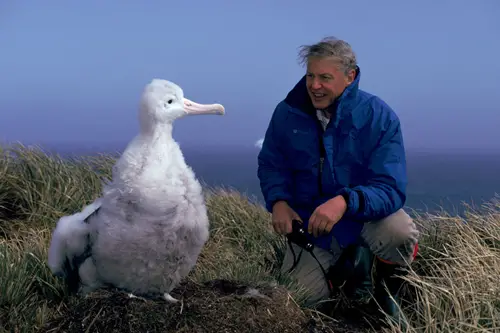David Attenborough, the renowned naturalist, and broadcaster, is known for his passionate advocacy for nature and wildlife conservation. As a man who has spent his life exploring and documenting the natural world, it’s no surprise that many people are curious about his personal choices when it comes to food. Specifically, many people wonder whether David Attenborough is vegan or vegetarian, given his strong views on animal welfare and environmental sustainability.
The answer to this question is not entirely straightforward. While David Attenborough has never explicitly stated that he follows a vegan or vegetarian diet, he has spoken about the importance of reducing meat consumption and the negative impact of animal agriculture on the environment. Some have speculated that he may be a “flexitarian,” meaning that he occasionally eats meat but mostly follows a plant-based diet.
In this blog post, we’ll dive deeper into David Attenborough’s beliefs about animal welfare and environmental sustainability, and explore his dietary choices in more detail. We’ll consider the arguments for and against his
Is David Attenborough Vegan or Vegetarian? He does not follow a vegan or vegetarian diet.

David Attenborough, the renowned broadcaster and naturalist, has long been associated with promoting conservation and the protection of our planet’s wildlife. However, when it comes to his dietary choices, there has been some speculation about whether he follows a vegan or vegetarian diet.
Despite his passion for environmental issues, David Attenborough has stated in interviews that he does not follow a vegan or vegetarian diet. While he acknowledges the environmental benefits of reducing meat consumption, he believes that a balanced diet that includes some animal products is important for overall health and well-being. Nonetheless, his advocacy for the protection of wildlife and the natural world continues to inspire millions around the globe.
Vegetarianism vs Veganism: What’s the difference?
Vegetarianism and veganism are two dietary lifestyles that have been gaining popularity in recent years due to their perceived health benefits and ethical considerations. While both vegetarians and vegans choose to abstain from eating meat, there are some significant differences between the two. Vegetarians typically avoid meat, poultry, and fish, but may still consume eggs and dairy products.
In contrast, vegans avoid all animal-derived products, including eggs, dairy, and even honey. Both diets can provide adequate nutrition if properly planned, but vegans may need to pay extra attention to ensure they are getting enough protein, iron, and vitamin B12 from plant-based sources. It is unclear whether David Attenborough follows a vegan or vegetarian diet, as he has not publicly disclosed his dietary preferences.
Why is David Attenborough not vegetarian?
David Attenborough is a well-known figure in the conservation and environmentalism community. With his years of experience in the field, he has been a vocal advocate for various environmental causes, including animal welfare and the reduction of greenhouse gases. Despite this, many people are curious about his diet and whether he is a vegan or vegetarian.
It may come as a surprise to some that David Attenborough is not a vegetarian, although he has reduced his meat consumption over the years. In interviews, he explained that he believes in the importance of sustainability and ethical farming practices, which can include the consumption of animal products. Additionally, he has stated that he believes in the value of local and traditional diets, which may include meat as a central staple. Overall, while David Attenborough is not a vegetarian, he remains a strong advocate for reducing meat consumption and promoting sustainable farming practices.
Attenborough’s views on animal welfare.
David Attenborough is a well-known and respected figure in the world of wildlife conservation and documentary filmmaking. While he is not a vegan or vegetarian, he is a strong advocate for animal welfare. Attenborough has spoken out about the impact of human actions on animals and their habitats, and he has called for greater efforts to protect and preserve these vital resources.
He has also highlighted the importance of reducing our consumption of meat and other animal products in order to mitigate the environmental damage caused by the meat industry. Attenborough believes that we have a responsibility to care for the planet and all of its inhabitants, and he encourages individuals and governments to take action to ensure a sustainable future for all.
David Attenborough Says The World Eats Too Much Meat
David Attenborough is a renowned broadcaster and naturalist who has long been an advocate for environmental sustainability. In recent years, he has spoken out about the negative impact of meat consumption on the planet and its resources.
Attenborough has shared his views on the subject in various interviews and documentaries, stating that the world eats too much meat and that this is a major contributor to climate change. However, despite his advocacy for reducing meat consumption, it is unclear whether David Attenborough is vegan or vegetarian. While some sources suggest that he follows a mostly plant-based diet, he has not publicly confirmed either label.
Nonetheless, his message about the impact of meat consumption on the environment remains an important one that many people around the world are taking to heart.
In conclusion
David Attenborough is a vegetarian. Though his dietary choices have evolved over time, his decision to stop eating meat dates back to the 1980s. Attenborough has also been an avid campaigner for environmental causes, recognizing the impact of animal agriculture on the planet. His shift to a plant-based diet serves as an example of how individuals can make small changes in their daily lives to help reduce their carbon footprint. As a public figure, Attenborough has used his platform to raise awareness about the need for sustainable living and the role of dietary choices in achieving that goal.
See also:










